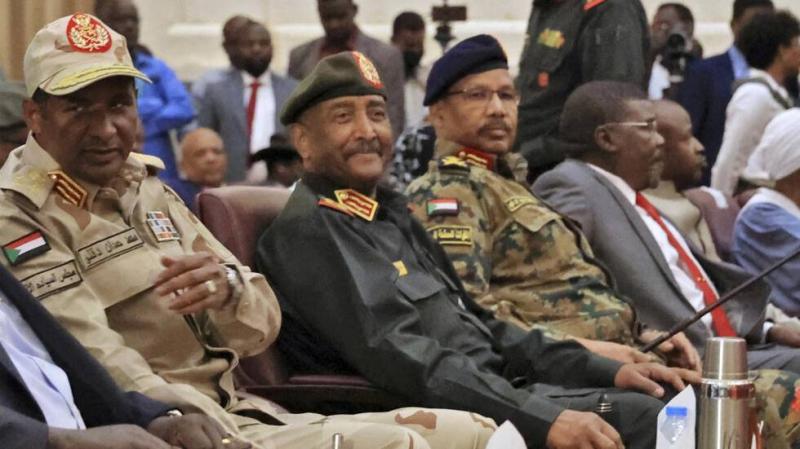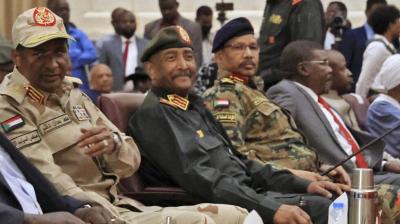The gains made by the Rapid Support Forces in West and South Sudan have broken a months-long stalemate in their conflict with the army, strengthening the paramilitary group’s ambitions and giving it leverage in negotiations taking place in Jeddah. The dominance of the Rapid Support Forces in the Darfur region, from which it originated, and its advances in other areas extending eastward toward the capital, Khartoum, have raised speculation about the possibility of Sudan facing another division 12 years after South Sudan's secession. However, analysts and diplomats say it remains unclear how the Rapid Support Forces could govern a seceded region. Instead, the forces are seeking to increase their access to resources, including gold, which they have used before to help build a financial empire, and to secure their role in any political settlement after seven months of ongoing fighting.
Suleiman Baldo from the Sudan Transparency and Policy Program stated that governance "means assuming responsibilities for food, health, and security... what they want is to be a party to the upcoming agreement." The Rapid Support Forces, which emerged from the heart of the Janjaweed militia that helped the army crush a rebellion in Darfur post-2003, claim they are advancing and engaging in clashes in the overpopulated city of El Fasher, the capital of North Darfur, as well as around army bases in Khartoum. They have pledged to reach Port Sudan on the eastern coast of the country, which has become the base for government officials and international missions.
Prominent politician Yasir Imran told Reuters that there is no immediate risk of Sudan's division, but it cannot be ruled out. He added, "There is a need for popular pressure, a significant mobilization against this scenario." Abdul Rahim Daglo, a brother of Hemeti, deputy commander of the Rapid Support Forces, stated on Tuesday that the talk of the country’s division is fueled by rumors propagated by opponents.
**Military Superiority**
The war erupted due to a plan to integrate the Rapid Support Forces with the army after four years of both sides working together to oust Omar al-Bashir during a popular uprising. The Rapid Support Forces quickly took control of areas in Khartoum and supply routes to the west before gradually forcing the army to retreat from parts of the vast Darfur and Kordofan regions and the southern part of the capital.
Since late October, the Rapid Support Forces have controlled army headquarters in Nyala, Zalingei, and Geneina, three of the five state capitals in the Darfur region. While the Rapid Support Forces initially relied on light weapons and limited artillery, witnesses in Geneina, Nyala, and Khartoum said they have recently used more drones and longer-range artillery. Two military sources indicated that the army’s warplanes, its main advantage over the Rapid Support Forces, require repairs, and that soldiers are weary of repeated defeats, dwindling supplies, and delayed salaries. They described retreats in Darfur as tactical withdrawals aimed at refocusing efforts on the capital. The army did not respond to a request for comment.
This month, the paramilitary forces briefly entered the heart of the Armored Corps base in southern Khartoum, one of the largest army bases, and took control of another base in the Jebel Awliya area, despite resistance from the army. Both sides exchanged accusations over the responsibility for explosions that occurred in Khartoum last week, which destroyed the Shambat Bridge and cut off a key supply route for the Rapid Support Forces, igniting fuel storages utilized by the force at the Geili refinery. Khaloud Khair from Confluence Advisory Research said, "The Rapid Support Forces want to control enough territory to declare unilateral victory, including Darfur of course, and Khartoum for sure, but most importantly Port Sudan."
**Humanitarian Crisis**
Analysts say the situation faced by the army has apparently pushed it back to ceasefire negotiations led by the United States and Saudi Arabia in Jeddah, which were suspended in June and resumed last month. They claim the Rapid Support Forces seek legitimacy in the talks following popular outrage over acts of looting, rape, and arrests attributed to its forces. In response to a request for comment, the Rapid Support Forces pointed to statements blaming their enemies and former fighters from the Bashir era for stirring up tribal conflicts in Darfur, stating they would hold accountable those responsible for violations.
The advance of the Rapid Support Forces has exacerbated a humanitarian crisis, which UN estimates say has caused over nine thousand deaths and displaced more than six million people of Sudan's 49 million population. Civilians living near army bases in Khartoum describe ongoing clashes.




